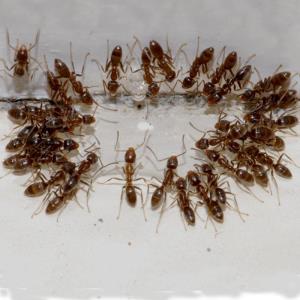Environmental Impact of Insect Control: Balancing Performance With Sustainability
The environmental effect of parasite control is an essential issue that requires a fragile equilibrium in between achieving efficiency in guaranteeing and taking care of bugs sustainability of our environments. From the usage of damaging chemicals that permeate right into our dirt and water to the unintended consequences on non-target types, the effects of conventional pest control practices are far-reaching.
Hazardous Chemicals in Pest Control
The usage of damaging chemicals in bug control presents considerable ecological and health risks that require careful consideration and reduction strategies. Chemicals, herbicides, and pesticides are typically made use of to eradicate pests, yet their prevalent application can cause unexpected effects. These chemicals can infect dirt, water resources, and the air, influencing not just the targeted bugs however also useful insects, wild animals, and people.

To attend to these threats, incorporated parasite management (IPM) techniques are being advertised as an extra sustainable alternative. IPM involves a mix of techniques such as biological control, environment control, and the targeted usage of chemicals as a last resort (ant control conover nc). By embracing an all natural technique to pest control, we can decrease the ecological and wellness impacts related to unsafe chemicals while successfully managing pest populaces
Effect On Non-Target Species
Thinking about the unexpected consequences of insect control approaches, the influence on non-target varieties is a critical aspect that calls for extensive assessment. While bug control procedures aim to target particular insects, other microorganisms in the ecosystem may be unintentionally affected. Non-target types, including advantageous bugs, birds, creatures, and even plants, can suffer indirect or straight injury from pesticide applications or biological control approaches.
Pesticides made to combat a specific bug pest may damage pollinators like bees or natural predators such as ladybugs. Biological control representatives, if not species-specific, can present dangers to unexpected targets, disrupting the ecological balance.
To minimize the impact on non-target species, incorporated insect monitoring (IPM) methods that emphasize an all natural strategy to pest control are advised. These approaches focus on making use of eco friendly practices, reducing injury to valuable microorganisms while efficiently taking care of pest populaces. Conducting extensive threat assessments and keeping an eye on the outcomes of bug control efforts are necessary action in protecting non-target varieties and advertising general community wellness.
Soil and Water Contamination
Unplanned environmental effects of parasite control methods extend past influencing non-target species, with substantial ramifications for soil and water contamination - ant control. Pesticides, herbicides, and chemical fertilizers made use of in parasite control can leach right into the dirt and infect groundwater, posing a hazard to both water and terrestrial communities.
Water contamination is an additional essential concern connected with bug control techniques. Overflow from agricultural fields treated with pesticides can carry these chemicals into nearby water bodies, influencing aquatic organisms and water high quality. Pollutants in water resources can have far-reaching repercussions, affecting not just water life but additionally human wellness via the consumption of contaminated water or marine organisms. To minimize soil and water contamination from insect control activities, incorporated bug management approaches that focus on sustainability and reduce chemical inputs are essential.
Air Air Pollution From Pesticide Use
Direct exposure to air-borne chemicals throughout agricultural applications postures a considerable problem for air pollution control measures. They can volatilize right into the air and form unstable organic substances (VOCs) and other airborne pollutants when chemicals are splashed onto plants - termite control. These chemicals can contribute to the formation of ground-level ozone, a major element of smoke that can have detrimental results on human health, plant efficiency, and overall air top quality. Furthermore, pesticide drift, where pesticides are carried by the wind to unplanned locations, can bring about the contamination of nearby environments and water bodies.

Strategies for Sustainable Parasite Control
In the realm of farming methods, executing sustainable insect control methods is extremely important for keeping eco-friendly balance and guarding crop returns. Sustainable pest control highlights using ecologically friendly methods to manage pest populations successfully while lessening damage to non-target organisms and environments. Integrated Pest Monitoring (IPM) is a commonly taken on strategy that combines organic, social, physical, and chemical control methods to attain lasting insect management solutions.
Crop turning and diversity are also efficient strategies to disrupt pest life cycles and develop less beneficial conditions for insects to grow. Eventually, by incorporating these sustainable insect control strategies, farmers can achieve a balance between pest monitoring performance and ecological stewardship.
Final Thought
In conclusion, the ecological effect of bug control approaches should be thoroughly taken into consideration to stabilize effectiveness with sustainability. Damaging chemicals utilized in bug control can cause dirt and water contamination, air contamination, and injury non-target types - ant control services. It is vital to execute sustainable insect control approaches to home minimize these negative impacts on the setting and promote a healthier ecological community for future generations
By taking on a holistic strategy to pest control, we can reduce the ecological and health influences connected with hazardous chemicals while efficiently taking care of pest populations.

To minimize the air pollution created by pesticide usage, it is crucial to take on integrated insect management approaches that prioritize the use of non-chemical bug control techniques, such as plant turning, natural predators, and immune crop ranges. Sustainable parasite control stresses the usage of ecologically pleasant techniques to handle parasite populations efficiently while lessening harm to non-target organisms and environments. Integrated Insect Management (IPM) is an extensively taken on technique that integrates organic, social, physical, and chemical control methods to achieve long-lasting bug administration solutions.
Comments on “Cost Effective Ant Control Solutions: Maintain Your Room Ant-Free”